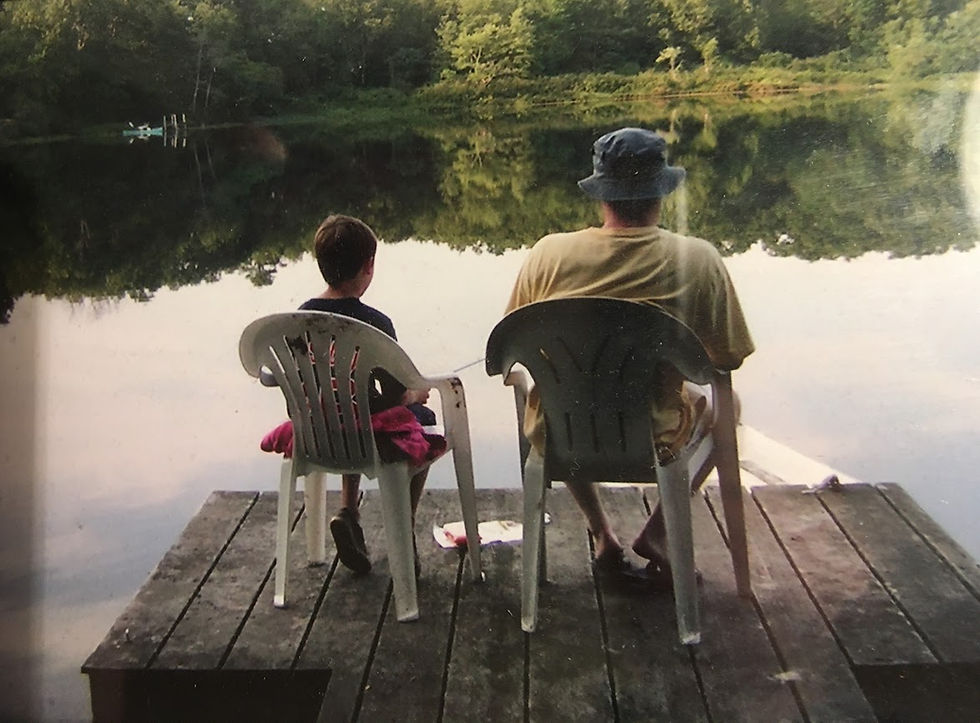Piano Camp
- knowles.1

- Sep 9, 2021
- 5 min read
Updated: Nov 9, 2021

Piano Camp started inauspiciously this year. Alexa (a real three-year-old, not a pretend person) fell against a foosball machine and had to be taken 45 minutes through the night to the local hospital. She was too young to be one of the students, but still it set the wrong tone. I knew Piano Camp was going to work when we came back at two in the morning and Alexa's Mom said that she had managed to get the bloodstains out of the carpet.
So the next morning Lyra and Taliesin (those are their real names) put on their lifejackets and walked through the forest to the small wooden playhouse where we would have our summer music lessons. At least Lyra did - the orange vest turned out to be necessary because some lunatic in the house up from us had decided to choose this of all weekends to take up target shooting in his backyard. That's Vermont for you.

The first problem, other than the direct threat to life and limb, was the large number of eyes watching us from the walls of the playhouse. The space, generously lent to us by a neighbor (the wife of the aforementioned lunatic, whose name is Harold), had been built for a performance of The Prisoner of Zenda in 1917, and was decorated with wildebeests. Actually some of them were elands, and okapis, and other useful Scrabble words. All of them were very dead, and I reassured Lyra and Tally that they would probably have been dead anyway by now. Lyra felt, quite properly, that they were looking strangely at her, so we put funny hats on them to neutralize them. Here is a wildebeest wearing a culturally inappropriate piece of headgear (the playhouse is full of culturally inappropriate artifacts, all of which were collected at about the same time that Isabella Stewart Gardner was raiding Italy). The feeling was that the hats were an improvement, though that's open for debate.

Then Julian, the next to youngest, knocked over a Chinese gong. He was briefly in some pain but shrugged it off. We ignored him and Lyra played "Lightly Row" in her lifejacket, a costume which lent the piece an aura of authenticity it would otherwise have lacked. Then we all went down to pick blueberries, which everyone agreed was the best part of the day. This is Alexa with her bowl of blueberries, a calendar photograph for August if there ever was one:

The idea for Piano Camp came from my own children's escapades when they were that age. Back in Sophie and Teddy's day, my two children would row around in a small pond and pick berries - I think also blueberries - from the edge of a pond in Rhode Island:

The pond was owned by the Ferrys, my parents' neighbors from the 1970s. The Ferrys were glorious company: funny, theatrical, slightly mad, fiercely talented, and willing to let you do whatever you wanted. That was the model, I thought, for what I wanted to be when I grew old. The Ferry children genially derided their parents' hospitality, calling it "Camp Runnynose." And it was true, there were always a lot of children running about, getting ice cream, stepping in cow pats, helping with the sheep, getting their hair stuck, needing to have their noses wiped. That was what summer was about. So in Piano Camp, up in our house in Vermont, I decided to do the same thing. To be an oldie for a pair of young tolerant parents and let their kids create their own memories.

Except in my world, there's no margin for error. None of this "do whatever you want" nonsense. Everything was timed down to the last minute, on an Excel file printed out the previous evening.
10:00: walk to the playhouse.
10:00-12:00: conduct piano camp.
12:00-12:30: pick blueberries.
12:30-1:00: inflate rubber rafts.
1:30: realize that the rubber rafts have a gigantic hole in the bottom of them and go swimming instead.
2:00: fish Julian out of pond.
2:30: go on zipline and swings.
3:00: naptime or walk to beaver pond.
5:00: Drinks at Poet's Bench.

5 o'clock is the best part of the day. The Poet's Bench is placed over the septic tank on a grassy hill overlooking the Green Mountains. At 5 o'clock Manhattans are served. Tally was indignant that this event was only for grown-ups, and insisted on cutting twigs for Smores with his hatchet. The Smores were delicious, though there was some argument about the right word for the correct texture of the chocolate, which needs to be the consistency of warm butter. Moist? Melty? You decide.

Then it was time for the final concert.

The neighbor, Fiona, came and opened up the side doors, telling us stories of the playhouse. One of my dogs, Olive, dug a hole in the front of the playhouse that was so deep that she buried her head inside (bad dog). The other dog, Bertie, stayed and listened (good dog). Tally played his two pieces and Lyra played her two, and in between I sang "Little Girls" from Annie by request. I didn't know the part of the orphanage mistress, Miss Hannigan, but some of her lines struck home:
The kids took advantage of their surroundings, and put on a show. Here is the text of the first skit:
EGBDF
Tally (seated at the desk, muttering over a piece of paper as he writes): E-G-B-D-F. E-G-B-D-F.
Lyra (enters): What are you writing?
Tally: I'm trying to think of a way of remembering the lines on a musical staff. E-G-B-D-F. (He starts, and writes down something quickly.) I know! Every Good Boy Deserves Fudge!
Lyra (excitedly): We must tell the township!
Tally (seizes bugle and marches to center stage): EVERY GOOD BOY DESERVES FUDGE!

(Curtain)
The second skit had three players. It has a rather neat twist on a standard vaudeville formula, which I first read about in Anne Tyler's Dinner at the Homesick Restaurant (I think). In the standard version, played entirely by one person, a man enters with a mustache (indicated by the right-hand index finger set horizontally above the upper lip), and says "You must pay the rent!" "I can't pay the rent!" says the same person, turning to the space vacated by the landlord, in a high female voice (without the mustache). "You must pay the rent!" says the landlord, played again by the same person, who has turned 180 degrees and put on the mustache again. "I can't pay the rent!" And then, with same index finger raised horizontally on the brow to indicate the brim of a hat, "I'll pay the rent!" (in a new manly voice, indicating chivalry of a high order). "My hero!" says the rescued lodger, falling into his or her own arms. This, however, is how Lyra's original take on the standard version played:
Rent
Lyra (in kimono, lying on a fainting couch): Oh what will I do! The bills are due tomorrow, and I am late to pay them. Ah me!
Mr. Sebastian (in African mask, jester's hat, and holding a druid's sceptre): You must pay the rent!
Lyra (turning to her tormentor): I can't pay the rent!
Tormentor (insistently): You must pay the rent!
Lyra (turning away in despair): I can't pay the rent!
Tally (in cowboy hat and holding a South African flag with a picture of Nelson Mandela, triumphantly): I'll pay the rent!
Lyra (moving to footlights, directly to audience): There's no need for that. I'm just behind on my payments, with so much else to do. The check will be in the mail tomorrow!

(Curtain)
And so Piano Camp is a generational event. It's meant for children, but it's also for their parents, and for people like me, whose children grew up long ago. That's the first rule of Piano Camp: you do it for yourself.

All photographs of piano camp reproduced by kind permission of Tim and Suzanne Lewis.






Comments